Department of English
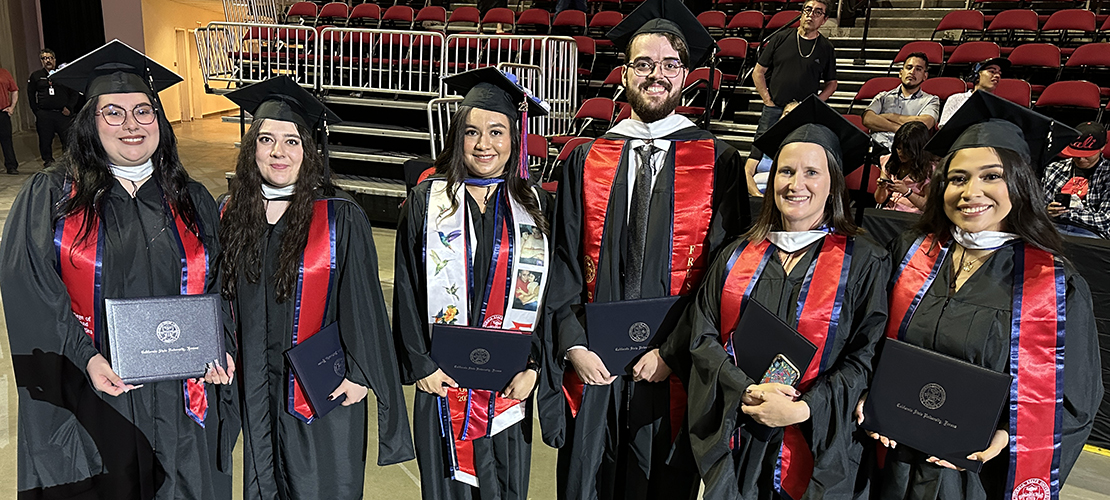
Welcome to the Master of Arts Program in English
Central California's home for literary scholars for more than 75 years, Fresno State’s Master of Arts Program in English has a long tradition and proven track record of student success. The program is a two-year, full-time course of study, with options in Literature or Rhetoric and Writing Studies.
The M.A. English program serves several categories of students: future secondary school teachers, future community college instructors, prospective Ph.D. students, and those interested in extending and intensifying the knowledge acquired in their undergraduate studies.
Additionally, many of our alumni have gone on to exciting careers in law, education administration, library science, counseling and social work, business, politics, marketing and communications, publishing, media, and more.
Program coordinator: Dr. William Arce (email)
Why an M.A. in English at Fresno State?
Our M.A. students thrive within a supportive and inclusive graduate student culture, an environment that includes opportunities to join clubs such as the Students of English Studies Association (SESA), present research at local and national academic conferences, and submit scholarly works for publication.
Literature faculty cover a breadth of literary time periods, ranging from medieval to contemporary. Research areas include digital humanities, environmental studies, ethnic studies, queer and gender studies, and more.
Rhetoric and Writing Studies faculty may focus on research areas such as classical rhetoric, contemporary rhetoric, critical theory, literacy studies, media and cultural studies, rhetorical criticism, rhetoric and philosophy, and visual rhetoric.
Our M.A. students immerse themselves in a multitude of unique graduate English courses, with subjects not only in Literature and Rhetoric and Writing Studies, but also in English Studies, Creative Writing, and interdisciplinary topics. Our department’s graduate faculty specialize in a wide range of research, writing, teaching, publishing, and education administration.
Over 75 years, dozens of our alumni have gone on to pursue doctorates at leading colleges and universities throughout the country, while hundreds of others secure employment and build careers as secondary school teachers, community college instructors, and program administrators in California’s Central Valley and beyond.
Student Support
Fresno State offers graduate students many opportunities for financial support and professional development.
Our graduate students can earn financial support and gain invaluable teaching experience while in the program by becoming a Teaching Associate, a Writing Center tutor, or a Graduate Writing Studio consultant. Additional tutoring opportunities can be found through the campus Learning Center, as well as programs such as TRiO Student Support Services, Upward Bound, and more.
.
Apply to the M.A. English Program
Applications are accepted once a year in the Spring semester for admission to the following Fall semester. For Fall 2026 admission, the deadline to apply is April 15, 2026.
Steps to Apply
Applying for admission to the Master of Arts Program in English (Literature option OR Rhetoric and Writing Studies option) requires two steps: University admission and the program admission. We also strongly recommend applying for financial aid and scholarships.
Those seeking admission to the M.A. English program should submit completed application forms - available online at Cal State Apply - to the University Admissions Office. The university will require transcripts and a $70 application fee.
International students may also need to submit a TOEFL or IELTS score. Please contact the International Office for current requirements for international students.
Admission to the M.A. English program assumes preparation equivalent to an undergraduate major in English or a related field in the liberal arts.
Students who do not already have a bachelor's degree in English will need to take 16 units of upper-division undergraduate preparation in order to attain classified standing and before being allowed to enroll in English graduate seminars.
These courses are prerequisites and will not count toward the 30 units of the M.A. Such students must successfully complete the following prerequisite courses:
- ENGL 105, Introduction to Literary Analysis
- British Literature: One of ENGL 146, 147, 150, 151, 152, or 156
- American Literature: One of ENGL 153, 154, or 155
- World Literature: One of ENGL 112, 113, 114, or 167
To read course descriptions, see the Fresno State catalog.
In addition, students are strongly encouraged to fill out a general Scholarship Application for California State University, Fresno, as well as a Free Application for Federal Student Aid (FAFSA). Please note that the deadline for these applications is different (read: earlier) than the program application.
See our English Department scholarships page for more details and support.
Program Admission Requirements
Please contact Dr. William Arce, graduate coordinator for the M.A. English Program, with any questions about course prerequisites, the admission writing sample, or other program admission requirements.
In lieu of meeting the above undergraduate course requirements for classified standing, students may take the Subject Graduate Record Exam (GRE) and submit a score above the 50th percentile.
A GRE score in literature is not required for admissions into the program, but is recommended for students intending to pursue a doctorate.
To achieve classified standing, both English and non-English majors must have achieved a GPA of 3.0 or better in their major. International students must also submit TOEFL or IELTS scores.
In addition, all candidates must submit a writing sample to the department's graduate committee, whose approval is necessary for admission to the program. This writing sample is due to the department by April 1 for admission the following fall semester, or by October 15 for admission the following spring.
The admission writing sample should be devoted to a sustained analysis (8-12 pages in length) of a text or related texts; it should demonstrate comprehensibility in exposition, clear and logical organization and presentation of ideas, and should establish a sound scholarly argument with thorough and complete documentation. The critical analysis should be modeled on MLA style guidelines and will reflect a knowledge and awareness of contemporary analytical theory in literary studies.
The writing sample will be submitted via Cal State Apply.
The admission writing sample will be evaluated by members of the English Department to determine whether the applicant is denied entry into the M.A. program or admitted under either Classified or Conditionally Classified standing.
After completing suggested coursework and obtaining no less than a B in such course(s), those admitted under Conditionally Classified Standing will be given one opportunity to submit one additional revised or new writing sample for review. If the second writing sample is not approved, the candidate will not be admitted into the program.
Candidates must also submit three (3) letters of recommendation and a Statement of Purpose. These will be submitted via Cal State Apply.
The Statement of Purpose should include information about who the candidate is, why they are applying, why they are a good candidate for this program, and what they plan to do with their M.A. in English.
M.A. English, Literature option
Degree information, 2025-26: University catalog
Consult the M.A. coordinator every semester for program planning. Detailed advising information is available in the M.A. Canvas shell.
M.A. English, Rhetoric and Writing Studies option
Degree information, 2025-26: University catalog
Consult the M.A. coordinator every semester for program planning. Detailed advising information is available in the M.A. Canvas shell.
M.A. Program Handbook
The following handbook should prove useful throughout your program of study in the M.A. in English program, but you should always verify with your Graduate Adviser any requirements that you find confusing. Plan to meet with your Graduate adviser regularly—at least once per semester—to make sure you are on track to meet your graduation goals. Most of the information here is enshrined either in departmental policy or university policy. Some of the guidelines here are just that: guidelines or advice to help you navigate the program.
You are responsible for meeting all deadlines set by the program, your thesis chair, the Department of English, and the Division of Research Graduate Studies (DRGS). Check the DRGS dates and deadlines page for the most current info, and familiarize yourself with these important explanations of the degree process and terminology.
The program coordinator also serves as the official academic adviser for all M.A. students. This person is your go-to resource for assistance and advice about the degree process, including paperwork, policies, and any course-planning questions. We recommend you meet with the adviser at least once per semester. Dr. William Arce is the current coordinator and adviser.
You are responsible for understanding and completing all coursework and degree requirements. Read the University’s General Catalog for the program and your option. Consult the DRGS website on a regular basis to stay aware of updates and deadlines. You must maintain an overall 3.0 GPA.
Students must complete their M.A. requirements within a five-year timeframe. For every semester a student persists within the program after five years, the earliest semester of coursework is no longer applicable to their program of study without validating that coursework. A student may request that coursework taken more than five years earlier be validated by submitting a Recommendation for Course Validation Form. Both the instructor and the M.A. Program Coordinator will determine whether a course can be validated and what means will be used to validate the course.
A limited number of CR-graded courses may apply toward a graduate degree program. However, if you can take a given course either for a letter grade or for CR, then you must opt to take it for a letter grade if you plan to count it toward your M.A. program of study. According to university policy, a maximum of 6 CR-graded units may be included in a 30-unit program.
Only four combined units of ENGL 290 and 291 may count toward your degree.
The English Department requires candidates for both options of the M.A. in English program to demonstrate a reading knowledge in a language other than English. This requirement can be satisfied at the undergraduate or graduate level through two years (four semesters) of coursework in a modern language other than English, one year (two semesters) of coursework in a classical language, or by taking a translation exam approved by the English Department. Students must satisfy this requirement prior to advancing to candidacy.
Students should submit a writing sample—usually a revised research paper written for a graduate seminar—at the end of a student’s second semester. Students must satisfy this requirement prior to advancing to candidacy. Faculty evaluators use the following rubric to assess GWSR writing samples:
Graduate Writing Skills Requirement Criteria
Assessment will be based on the following criteria:
Scholarly Merit: This category speaks to the viability of the project, the clarity and focus of the thesis, and the development of an argument. It seeks to ensure that the ideas and interpretations expressed are relevant to important issues or ideas circulating in contemporary discussions of the same topic.
Organization and Structure: This category looks to ensure that arguments are conducted as logical, progressive developments of an idea through coherent, well-organized paragraphs. The essay has an effective introduction, and a thoughtful conclusion.
Complexity of Evidence and Analysis: This category speaks to use of apt sources and ability to explain their significance. The quality and quantity of evidence matters here, but so does the fairness with which the arguments of others are represented and discussed.
Professionalism: This category addresses the formal and mechanical elements of producing an academic argument. Essays should display appropriate academic conventions, format, and style, including citations. Diction level should be appropriate to audience.
Evaluation Rubric
A writing sample must receive two evaluations of accomplished to satisfy the GWSR.
Accomplished
Scholarly Merit: The topic is timely and carefully focused. While it does not have to make an original argument, it would serve as a good basis for further research on the subject. Discussion does a creditable job summarizing related literature. The thesis is sufficiently limited in scope; usually stated early on and present throughout the essay as a controlling (not repeated) idea.
Organization and Structure: Major points raised are relevant to the topic and are logically arranged to provide a coherent argument. Transitions and organizational structures such as topic sentences and sub-headings are used which help the reader move from point to point.
Complexity of Evidence and Analysis: Sources are well-chosen and deployed in a range of ways (to motivate the argument, provide key terms). The writer invites complications and considers counterarguments. Analysis is insightful and fresh, more than summary or paraphrase; shows how evidence supports thesis; it should dwell in depth on one or more key examples.
Professionalism: Style and conventions are academically appropriate and consistently used. Nor do errors in mechanics interfere with comprehensibility. Demonstrates thoroughness and competence in documenting sources; the reader would have little difficulty finding citations.
Developing
Scholarly Merit: Although the essay has a focus, it does not participate in a critical conversation. It may be too broadly conceived, without enough specifics and nuances to distinguish a real problem and to address that problem. The essay may be a largely ‘interpretive summary’ of the text, but will feature some insightful moments. OR it could be an essay that is chiefly a personal reaction to something, well-written but with scant intellectual content—mostly opinion.
Organization and Structure: Writing does not progressively develop an argument. Structure: generally logical, but either confusing in places (big jumps, missing links) or overly predictable and undeveloped; few complications or considerations of counter-arguments; some disorganized paragraphs (either bloated or skimpy). References may be unclear; arguments may be tangential in some places.
Complexity of Evidence and Analysis: Essay uses a limited range of sources without an awareness of larger array of criticism and/or theory. Evidence builds up a list rather than an articulation of cause-and-effect relationships among ideas. OR works may be quoted and cited correctly, for the most part, but deployed in limited ways, i.e., oversimplifying others’ arguments or manipulating research to affirm of the writer’s point of view.
Professionalism: Paper lacks consistency of style, format. Frequent mechanical errors make reading difficult and interfere with comprehensibility. Thoroughness and competence at documenting sources may need strengthening.
Beginning
Scholarly Merit: Essay reveals superficial job of research. Argument depends too heavily on plot summary or paraphrase. The reader is left with very little new understanding of the problem or topic. Thesis can exhibit one of several problems: vague, descriptive, or confusing; parts unintegrated (e.g., three unrelated prongs); only implied or not stated early on; not argued throughout, disappears in places. No clear explanation of literary, cultural and intellectual contexts appears.
Organization and Structure: Reading and comprehensibility are problematic. Writing demonstrates lack of logical development and focus, causing problems with reading and comprehension.
Complexity of Evidence and Analysis: Use of existing scholarly/professional literature on the topic is inadequate. Sources used are dated or irrelevant. Interpretation of sources may present some misreadings.
Professionalism: Conventions of style and documentation are not followed. Mechanical problems abound.
This is a crucial requirement, and students must complete this requirement in a timely manner. Otherwise, their planned graduation date may be delayed.
You must have completed 9 units of coursework, maintained a 3.0 GPA, and completed the Language and GWSR Requirements before submitting a Petition of Advancement to Candidacy (ATC) for the Graduate Degree. You will not be able to enroll in thesis units or submit a Thesis Committee Assignment Form until the ATC Petition is submitted.
If you plan to graduate within two years (four semesters), the ATC Petition—available here from the Division of Research and Graduate Studies (DRGS) website—should be submitted at the beginning of your third semester. The ATC Petition lists all courses the student has already taken, along with the courses the student plans to take to complete their degree. Work with the graduate adviser to complete the form properly.
Check the DRGS graduate degree deadlines page for ATC Petition timelines, especially if you intend to enroll in thesis units the next semester. A delay in ATC petition form approval can result in problems with your "satisfactory progress toward degree" standing, which can in turn affect your Teaching Associate (TA) position, your registration options, and your Financial Aid status.
The following kinds of courses may NOT be listed on your ATC Petition: lower-division courses (1-99) and upper-division courses that satisfy General Education or the Upper-Division Writing Requirement (W courses). See page two of this form for a full list of Course Limitations for Graduate Programs. Courses in which you received a grade of CR, when a letter grade was possible.
Any changes to the program of study you proposed on the ATC Petition—for instance, if you take classes other than those you’d planned to take—must be noted and approved by both the adviser and DRGS. Many students have to file at least one Program Adjustment Request (PAR) forms—available here from the DRGS website—before they graduate.
See page two of the PAR form for a full list of Course Limitations for Graduate Programs.
Your thesis committee will consist of three people, in most cases graduate faculty members in the English Department, who will work most closely with you to complete your thesis manuscript. Talk with them early and often. After your first year of study, you should be ready to ask a member of the English faculty to chair your thesis committee. That person will become your primary mentor and should probably be someone with whom you’ve already established a good working relationship and who has some expertise in the field of study you have chosen. While every committee will function differently and according to each student’s thesis project and needs, you should plan to work especially closely with your chair to determine when and to what extent you will be soliciting input from your other two thesis committee members. Keep in mind that everyone on your committee must sign off on the final thesis, so be sure you are keeping open lines of communication among you and your committee members and that you follow a clear timeline that respects the commitments of everyone involved. The other two members will usually be English Department faculty, or (with program approval when there is a good reason) one of them might be from another department.
Make sure to work closely with your thesis chair to chart out your writing process, making sure to establish clear due dates and other logistics. You should read the thesis manuscripts of some former students in the M.A. program (available in the Library) and to familiarize yourself with the proper format.
The Thesis Committee Assignment Form—available here from the DRGS website—should be filed until after or alongside the ATC petition. At this time, the Thesis Committee Assignment Form must also be filed and approved. All three members of your thesis committee and the M.A. Program Coordinator must sign it.
This should be an example of scholarly writing of significant length that demonstrates the following abilities:
- To join a scholarly conversation in your area of specialization
- To think critically and sustain a focused argument
- To interpret and analyze primary texts, cultural artifacts, or data
- To incorporate appropriate scholarly voices
- To follow professional stylistic guidelines for citing your sources and formatting your final draft
- To revise and polish your writing to ensure that it is clear, coherent, and free of errors.
Scope and Length
As a general rule, you should plan to submit a thesis of between 50 and 80 pages in length, although your thesis committee chair will work with you to determine the appropriate scope and length of your thesis. For a piece of writing this size, you should plan to organize your writing according to a format that allows for discrete but related sections and subsections. This may take the shape of chapters, but, once again, your thesis committee chair will help you determine the proper structure for the argument you are forwarding.
Human or Animal Subjects
If you will be working with human or animal subjects, then you should notify your thesis committee chair and your graduate adviser so that you can move through the appropriate training to begin doing such research.
When to Write and Revise Your Thesis
You should have begun writing your thesis during your second-to-last semester, during which you will enroll in your first 2 units of ENGL 299 (Thesis). Of course, you would be wise to consider your thesis topic earlier and to write course papers with an eye toward your thesis before you first enroll in ENGL 299. The final 2 units of ENGL 299 are designed to help you revise a draft that you will have already finished. You will not be able to draft and submit a thesis by the mid-semester deadline within your final semester. The final semester should be devoted to the final stages of revision and polishing, allowing sufficient time for feedback from your thesis committee members.
Working with Your Thesis Committee
Be sure you provide your committee members enough time to read your thesis and give feedback. This feedback will be crucial to you as you revise and polish your thesis manuscript. Solicit from your committee members a clear set of deadlines that allow you to make the necessary revisions to your thesis.
If your thesis committee chair determines that your thesis needs more work than you can complete in order to graduate when you had expected, you will need to delay your plans for graduation.
Registering for Thesis Units
Sign up for thesis units (ENGL 299) by submitting a Supervised Course Request form, available here from the English Department website. The same form is used to sign up for an Independent Study or an Independent Reading course. It requires signatures from your thesis chair and the coordinator, and you must have an approved ATC petition form and thesis Committee Assignment Form already completed. The number of units will, in most cases, be 2 units during your second-to-last semester and 2 units during your final semester.
After approval, the English Department’s administrative assistant will give you a permission number to enroll in ENGL 299. If you are unable to finish your thesis during the semester you planned to graduate, you may enroll in ENGL 299C thesis continuation units; Students enrolled in ENGL 299C (0 units) are still required to pay enrollment fees. (See this page on Tuition and Fees to learn about current mandatory fees for graduate students enrolled in 0 units.) You may not enroll in more than two instances of ENGL 299C. Use the Supervised Course Request form (above) to enroll in ENGL 299C.
Submitting Your Thesis
Check the DRGS dates and deadlines page for the final deadline for turning in your approved thesis. The deadline typically comes around midterm. This means that you should have your thesis very close to completion before the semester you expect to turn it in and graduate.
Please note that there is a precise format required at Fresno State for thesis submission. The DRGS thesis consultant (currently Debra Neufeld) offers workshops and individual help with this, and there is a template on the DRGS Dissertation and Thesis Office page to help you get your thesis into the required format.
This requires completing an online form and making a payment through your student portal; electronic approval must be given by the M.A. Program Coordinator. Check this page for deadlines appropriate to the semester you choose to graduate.
Timeline
Students are invited to work toward degree completion at their own pace within a two- to five-year timeframe. The following timelines (two- and three-year plans) reflect the most common ways in which students chart out their programs of study.
Two-Year Plan
The following timeline is meant to chart when particular requirements and deadlines should be met in order to graduate within a two year (four semester) timeframe. Students opting for this timeline will need to have completed at least one year of modern language instruction or opt to satisfy the language requirement by examination or through one-year of classical language instruction.
ENGL 205 (for fall admits) and one other graduate seminar
First semester of classical language (if satisfying language requirement through classical language instruction) OR
Take language examination (if satisfying language requirement through classical language instruction)
Submit admission writing sample to move from conditionally classified to classified standing at the end of the semester (for students admitted as conditionally classified)
Submit Classified Standing Graduate Request (for those approved to move from conditionally classified to classified standing)
2 graduate seminars (ENGL 205 for spring admits)
Second semester of classical language (if satisfying language requirement through classical language instruction)
Submit Graduate Writing Skills Requirement writing sample at the end of the semester
Submit Petition of the Advancement to Candidacy for the Graduate Degree by the deadline
1 or 2 graduate seminars
Enroll in 2 units of ENGL 299 (thesis units)
Submit Graduate Thesis Committee Assignment form
Submit online Graduate Application by the deadline
1 or 2 graduate seminars
Enroll in 2 units of ENGL 299 (thesis units)
Submit thesis by midterm deadline
Submit Graduate Degree Clearance Form to M.A. Program Coordinator one week before deadline
Three-Year Plan
The following timeline is meant to chart when particular requirements and deadlines should be met in order to graduate within a three year (six semester) timeframe; it will accommodate students who opt to satisfy the language requirement by taking two years’ worth of modern language instruction. This option is also optimal for students who choose to maintain part-time enrollment.
ENGL 205 (for fall admits) and (optional) one other graduate seminar
First semester of modern language instruction, OR
First semester of classical language (if satisfying language requirement through classical language instruction) OR
Take language examination (if satisfying language requirement through classical language instruction)
Submit admission writing sample to move from conditionally classified to classified standing at the end of the semester (for students admitted as conditionally classified)
Submit Classified Standing Graduate Request (for those approved to move from conditionally classified to classified standing)
1 or 2 graduate seminars (ENGL 205 for spring admits)
Second semester of classical language (if satisfying language requirement through classical language instruction)
1 or 2 graduate seminars
Third semester of classical language (if satisfying language requirement through classical language instruction)
Submit Graduate Writing Skills Requirement writing sample at the end of the semester
1 or 2 graduate seminars
Fourth semester of classical language (if satisfying language requirement through classical language instruction)
Submit Petition of the Advancement to Candidacy for the Graduate Degree by the deadline
1 or 2 graduate seminars
Enroll in 2 units of ENGL 299 (thesis units)
Submit Graduate Thesis Committee Assignment form
Submit online Graduate Application by the deadline
1 or 2 graduate seminars
Enroll in 2 units of ENGL 299 (thesis units)
Submit thesis by midterm deadline
Submit Graduate Degree Clearance Form to M.A. Program Coordinator one week before deadline
.
Meet Our Students
Our M.A. program aims to attract diverse and promising scholars from the central San Joaquin Valley, throughout California, and beyond.
2025 Cohort

Wendy Abrego-Miranda
Literature

Stephanie Axsom
Literature
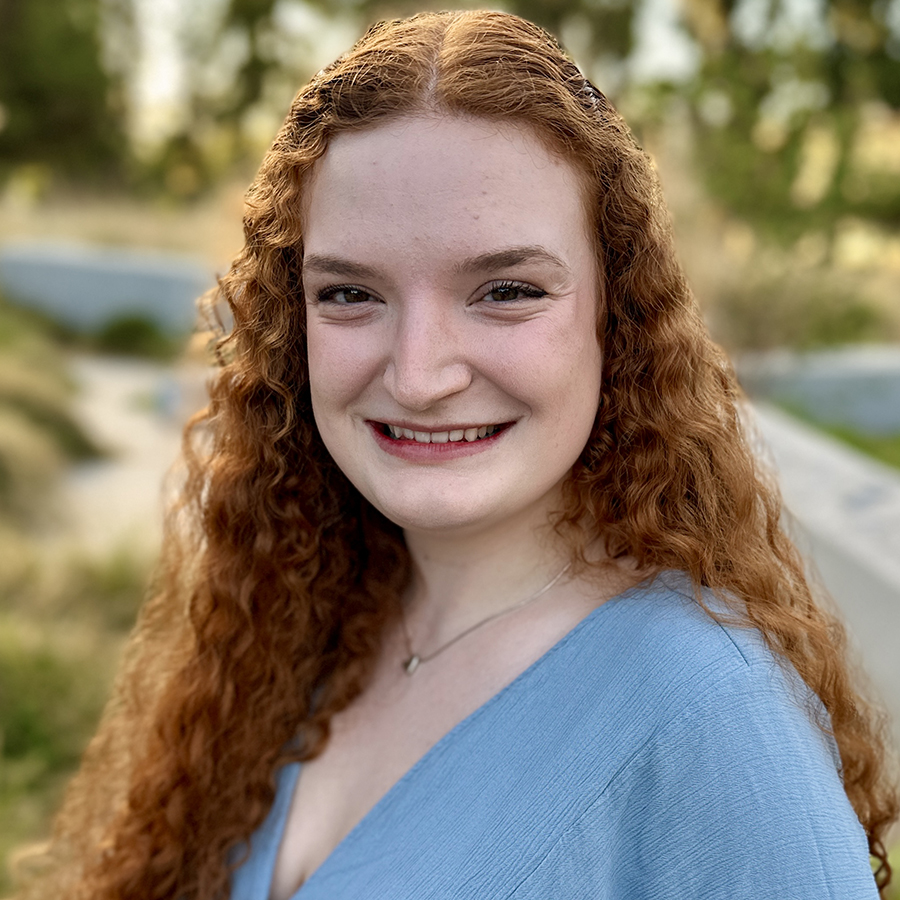
Mariah Gabler
Literature

Christopher Gutierrez Cazares
Rhetoric and Writing Studies

Jacquelyn Mejia
Rhetoric and Writing Studies
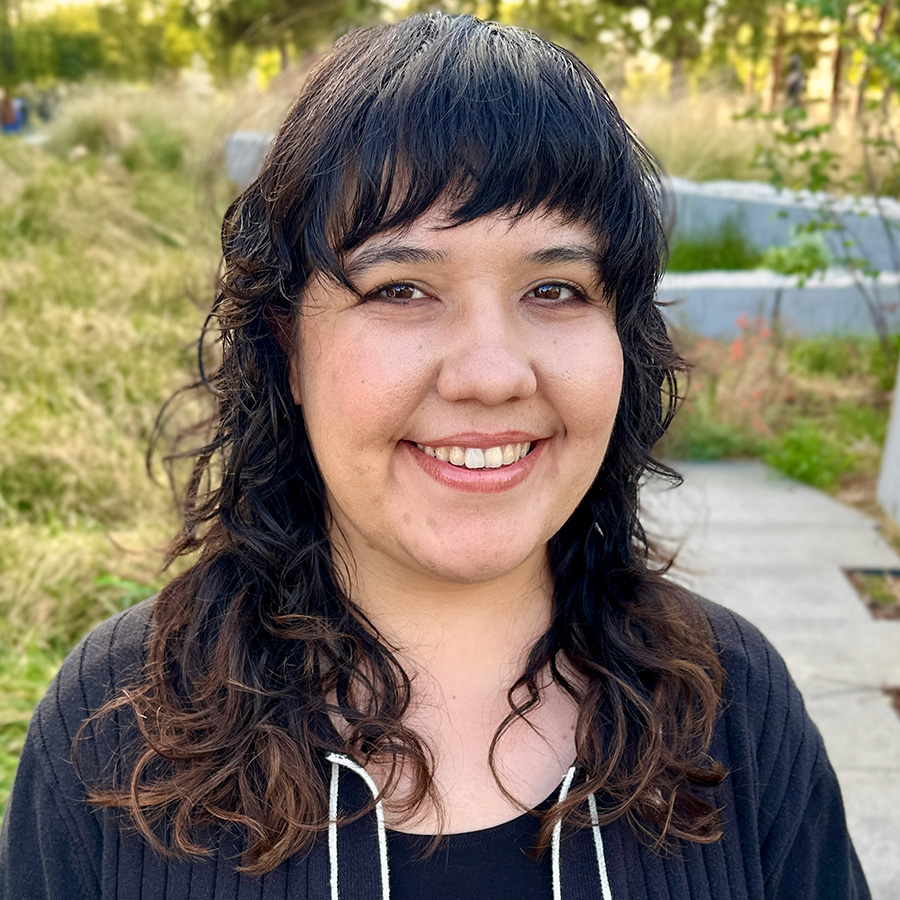
Julia Rodriguez
Rhetoric and Writing Studies
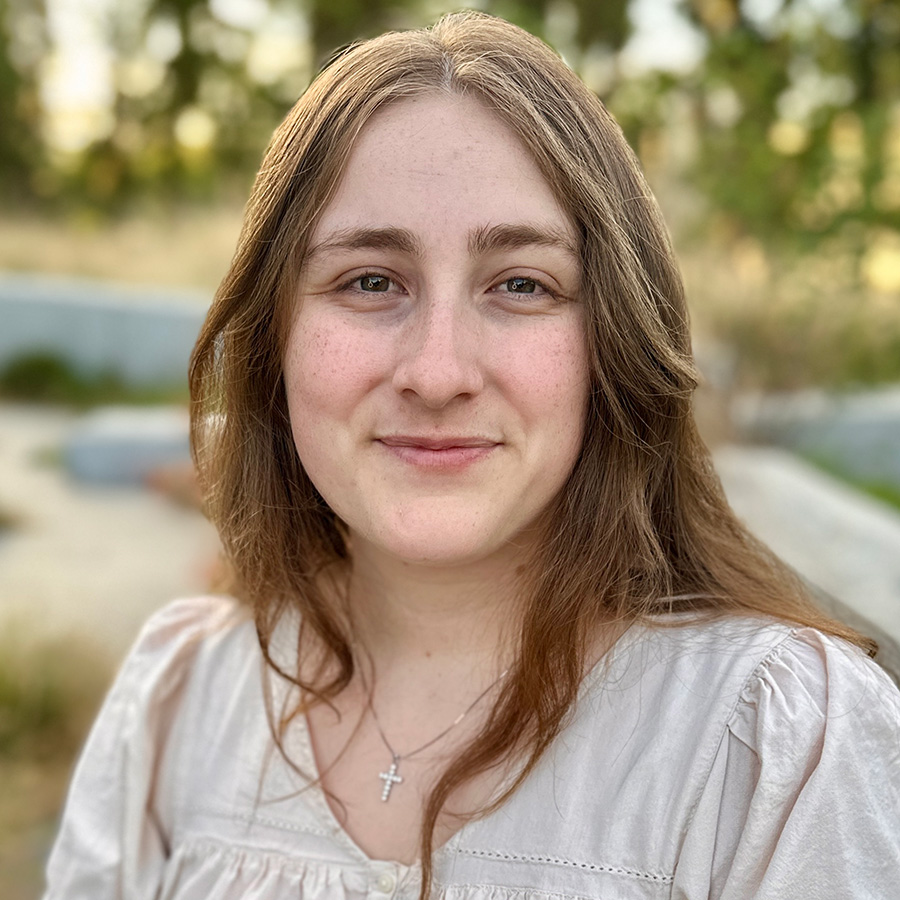
Logan Sylvia
Literature

Jessika Torres
Literature

Anthony Zarate
Literature
Continuing Students
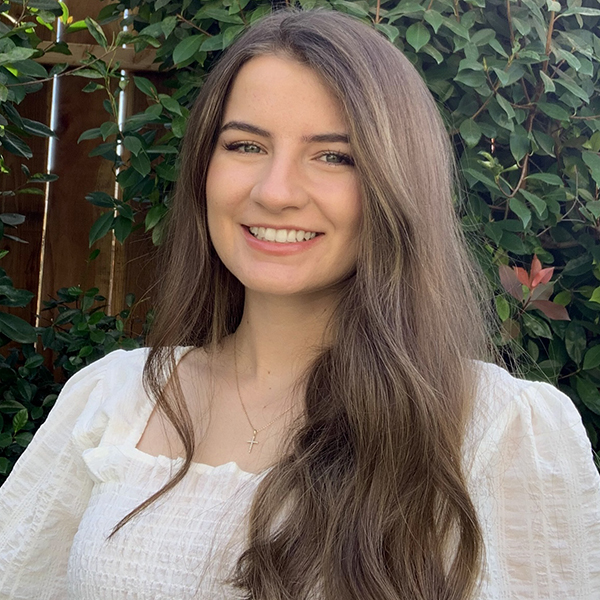
Kendra Barton
Literature

Jackie Cepeda
Rhetoric and Writing Studies

Seth Ervin
Literature

Destiny Galaviz
Rhetoric and Writing Studies

Claire Hall
Literature

Victoria Hopper
Rhetoric and Writing Studies

Arvin Kaila
Literature

Jayla Kajitani
Rhetoric and Writing Studies

Jasmine Kaur
Literature
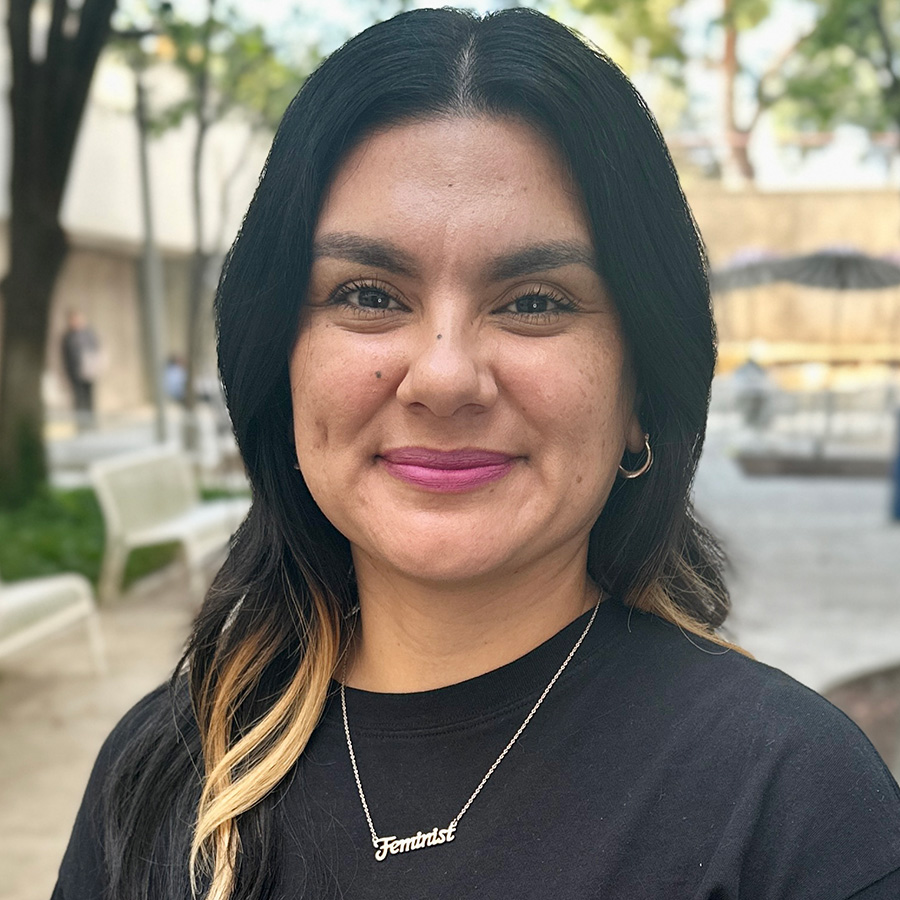
Erica Lopez
Literature

Nicholas Pappas
Literature

Freddie Rosas
Literature

Joshua Sagouspe
Literature
Aliyah Torres
Literature
Eugene Urrutia
Literature

Hope Vang
Literature
A Xiong
Rhetoric and Writing Studies
.